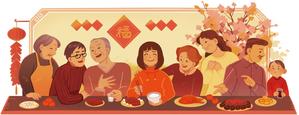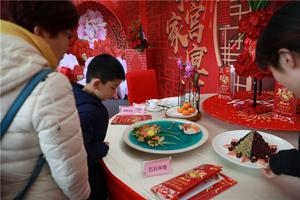Some young people dread the inevitable personal inquiries from relatives during the celebrations. Yang Zekun reports.
 (LIANG LUWEN / CHINA DAILY)
(LIANG LUWEN / CHINA DAILY)
Spring Festival is a joyous time for almost all Chinese, but like many members of the younger generation who work in big cities and are single, Zhang Ziyu has mixed feelings about the forthcoming celebrations.
In recent weeks, the 27-year-old has thought a lot about how to answer the inevitable questions from parents and relatives, such as when he will find a girlfriend and get married, but he still scratches his head when discussing the topic.
At the beginning, when I had just started working in Beijing, I hated my relatives asking questions such as how much I earned, if I had a girlfriend or when I would marry
Zhang Ziyu, a 27-year-old who works in Beijing and has mixed feelings about Spring Festival
"I am still not well-prepared for the upcoming 'killer serial inquiries' from my relatives," he said. At last year's Spring Festival, he promised his parents he would find a girlfriend, but has yet to do so.
Being asked endless questions by relatives is a common experience for young Chinese. Students are quizzed about marks in their exams, while those who work away from home are questioned about such things as relationships, jobs, income, promotion prospects, car and home ownership.
Therefore, every year, Spring Festival is a battle of wits and courage between young people and their relatives.
Caution
Though many young people know the kind of questions they will face, they still need to be cautious and well-prepared. Some even choose to travel overseas with friends during the holiday, rather than go home and face such questions.
"At the beginning, when I had just started working in Beijing, I hated my relatives asking questions such as how much I earned, if I had a girlfriend or when I would marry," said Zhang, a native of Shaanxi province, who works in the movie industry.
Having worked in his favored sector for three years since getting a master's, he is familiar with the questions he will face.
 Lu Xiaojie (right) picks up his girlfriend and presents her a bunch of flowers upon her arrival at Chongqing West Railway Station in Southwest China's Chongqing municipality, Jan 19, 2020. (PHOTO / XINHUA)
Lu Xiaojie (right) picks up his girlfriend and presents her a bunch of flowers upon her arrival at Chongqing West Railway Station in Southwest China's Chongqing municipality, Jan 19, 2020. (PHOTO / XINHUA)
"Usually they come from older relatives. I used to wonder if they were trying to unearth secrets or make fun of me, because all the questions were quite personal. It was as if I had no privacy in front of them," he said.
"Most of my relatives live in small towns, so they think that working in a first-tier city like Beijing means I must have a good income and lifestyle, and everything is going well. The truth is that like many young people who have only worked in Beijing for two or three years, my life is generally very hard because of the high cost of living and intense competition."
When questioned by relatives, he always responds with short answers and a quick smile, before quickly moving their attention onto other topics, such as food, clothes and entertainment.
"Actually, after chatting with my family in recent years, I have come to understand why they ask such questions, and I now know they are not based on bad intentions," Zhang said.
 Visitors admire replica dishes for Chinese New Year's Eve at a folk custom show in Xi'an, Shaanxi province, on Jan 11, 2020. (PHOTO / CHINA NEWS SERVICE)
Visitors admire replica dishes for Chinese New Year's Eve at a folk custom show in Xi'an, Shaanxi province, on Jan 11, 2020. (PHOTO / CHINA NEWS SERVICE)
Different lives
Young people who work in big cities usually go home once or twice a year, often during holidays. Most of the time, they and their relatives work and live in different fields and places, which results in a huge gulf between them.
In the happy Spring Festival atmosphere, the relatives usually chat with each other to avoid appearing bored when they gather together. Later, the older relatives start conversations by raising the questions that interest them the most.
Yang Yuting, who started a technology internship in Shanghai at the end of last year, said: "As my family's oldest child, I am naturally the focus of inquiries from aunts and uncles. They ask me about my job, relationships and other things, but the questions don't embarrass me anymore."
The 25-year-old comes from Anhui province, but her family now lives in Suzhou, Jiangsu province. Their relatives live quite near them, so they can meet frequently, which provides Yang's aunts and uncles with plenty of information about her situation.
"I think it is fine that they ask me some personal questions. I usually answer patiently, but what I cannot bear is that they sometimes like to judge my situation based on their own experiences," she said.
"For instance, some of my relatives think girls should find a stable job after graduation, then have a steady relationship and get married, rather than spending too much time on so-called interests."
 A worker hangs a festive fish lantern amid red lanterns.jpg
A worker hangs a festive fish lantern amid red lanterns.jpg
Hard-wired beliefs
She believes that some beliefs are hard-wired into parents, such as wanting their children to study hard and gain good results at college. The moment the child graduates, those thoughts are immediately transformed into urging them to find a job and meet someone to marry.
"I just don't want to work right after graduation. I need to think clearly about what kind of person I'm going to be and what kind of relationship I want in the future. I don't want to be pushed by the people around me."
Yang has no intention of blaming her relatives when they ask personal questions, because she believes that when they raise such issues they are just trying to make their relationship closer.
"It is just another way that my relatives can show their love for me, so I will respect them, but I will also insist on my own way of life," she said.
Contact the writer at yangzekun@chinadaily.com.cn


